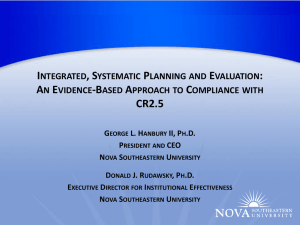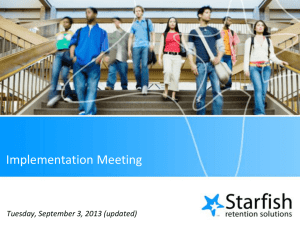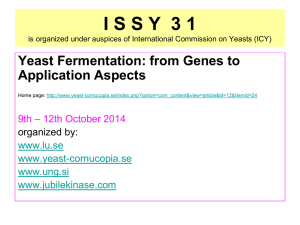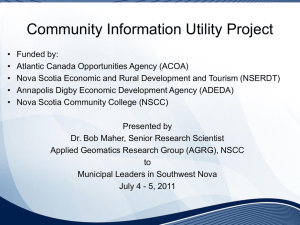edu5000 - Fischler School - Nova Southeastern University
advertisement
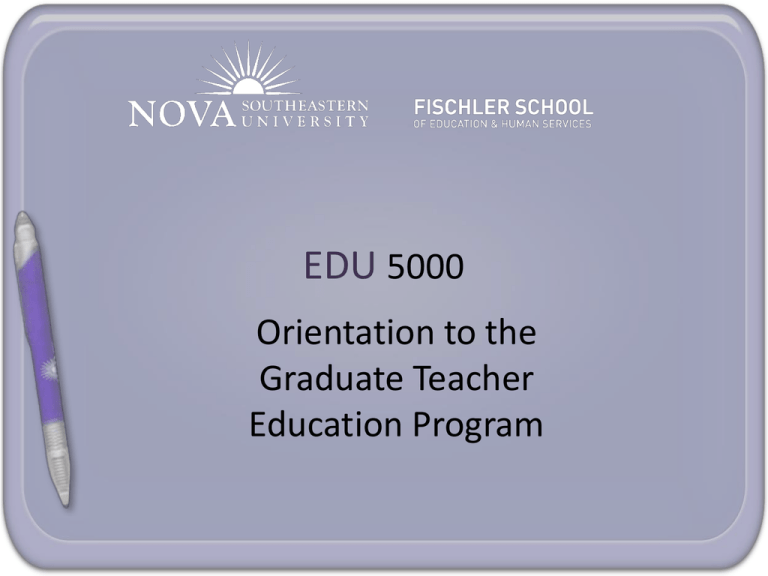
EDU 5000 Orientation to the Graduate Teacher Education Program Welcome! • We are glad that you have joined the Graduate Teacher Education Program (GTEP)! To best use this presentation… • Right click on the link to Open in a New Window. (This will keep you from losing your place.) • Remember, all links are active. (They are underlined.) Try multitasking… To use or review these slides, open additional windows to practice as you progress. – Press File New Window You can work on additional tasks in the new window. – Press Alt + Tab to shift between windows. NSU’s Conceptual Framework - SUNRISE • Nova Southeastern University provides: • • • • • • • Standards-based instructional and leadership programs that link theory to practice with the Use of data for evaluation, ethical decision-making, and intervention for the Needs and accommodations for diverse students who provide Reflective and ethical practice based on meaningful field and clinical experiences as part of Innovative and convenient postsecondary delivery systems with a Shared responsibility for quality education programs and professional advocacy with stakeholders with an Emphasis on technology and best practices for dynamic learning environments What will EDU 5000 do for you? • During this EDU 5000 orientation, you will: 1. Learn to access information to help you succeed in your program. 2. Access financial aid information.* 3. Discover money management strategies that will help you as you progress through your program.* *FSE and NSU are required by the U.S. Department of Education to share this information with you. EDU 5000 Outcomes By the end of EDU 5000, you will know how to be successful in your GTEP program of study as you learn to ... • • • • • • Register for your NSU e-mail account. Obtain a Personal Identification Number (PIN). Contact an advisor. Locate course schedules. Register for courses. Locate course syllabi, materials, and textbook lists. EDU 5000 Outcomes (cont.) • Use SharkLink and WebSTAR to: • • • • • Change personal information. Check on financial aid. Work with transcripts. Get grades. View course descriptions. EDU 5000 Outcomes (cont.) • Access Blackboard for: – – – – – online classes chats e-mail discussions submitting assignments EDU 5000 Outcomes (cont.) • Use SharkLink to: – check e-mail. – attach files to e-mail. • Access information on portfolio seminars (EDU 601 / EDU 602 and EDL) or simulation courses (EDU 600 / EDU 620) • Access the NSU Library and Electronic Resources. • Locate program contact information. Technology Tips http://www.nova.edu/help/students/index.html For help with -Blackboard -SharkLink -WebMail -WebSTAR Another technology tip… • If all else fails, call the NSU Help Desk at 800-986-3223, ext. 2HELP (ext. 24357). Almost 24/7 access! Your NSU Account NSU Identity All students must use their NSU identity for: 1. 2. 3. 4. 5. 6. E-mail (SharkLink) Registration (SharkLinkWebSTAR) Blackboard (access online courses) Course syllabi NSU Electronic Resources Information (The NSU e-mail account is the official method of electronic contact with the university.) NSU Identity https://www.nova.edu/sbin/nsulookup/pa/nsuid NSU E-Mail Features • Forward your e-mail http://www.nova.edu/bin/emailforward • Create a vacation message http://www.nova.edu/bin/vacation.pl Obtain a PIN (Personal Identification Number) 1. Call (954) 262-4850 (local to Ft. Lauderdale) or 2. Call (800) 986-3223, ext. 24850 or 3. E-mail pinhelp@nova.edu PINs are only mailed to your home address. Allow 7-10 days to receive a PIN by U.S. mail. Forget your PIN? https://sharklink.nova.edu • Under Personal Information, click Change your SharkLink Password. • Answer your security question. • Enter a new PIN. Or • Call (954) 262-4850 (local) or 1-800-986-3223 (ext. 24850) between 8:30 a.m. and 5:00 p.m. (weekdays). • E-mail pinhelp@nova.edu. (Your PIN will be U.S. mailed to you.) Student ID Card Identification cards are available for all students http://sharklink.nova.edu (Student Tab) or http://www.nova.edu/nsucard/ Let’s review! • What are the two things that you need to get started? 1. NSU identification number 2. PIN (only if you use WebSTAR) • What do you do if you lose your NSU PIN? 1. Click https://webstar.nova.edu/pls/PROD/twbkwbis.P_WW WLogin or 2. Call (954) 262-4850 (local to Ft. Lauderdale) or 3. Call (800) 986-3223, ext. 24850 or 4. E-mail pinhelp@nova.edu http://apps.fischlerschool.nova.edu/sswr/ •Available 24 hours a day, 7 days per week •Get your answers from the Office of Student Services fast —no phone tag! Need to talk to an advisor? 800-986-3223, ext. 21559 Your advisor will: • Arrange a schedule of classes for your degree. • Provide a program outline. • Provide you with any updates or changes to your program outline. • Guide you to certification information. Plan ahead! • Calendar, refund schedule, and tuition are located at http://www.fischlerschool.nova.edu/currentstudents/tuition-and-fees . Class Schedules http://www.fischlerschool.nova.edu/currentstudents/master_edspecialist-schedule (Use SharkLink for class schedules.) •Program dates •Registration (WebSTAR) •Syllabi and textbook lists Selecting the Course • Begin at the program schedule page at http://www.fischlerschool.nova.edu/currentstudents/master_edspecialist-schedule • Select Schedules. Course Session • Select the session for which you wish to take courses. Select Location To sort, click on the individual schedule headers (in cyan/aqua). Finding the CRN • Note the CRN (Course Reference Number) next to each course you desire. • You will find the courses listed by the CRN, course number, location, title, etc. Let’s review! • How can you contact your advisor? 1. SOS - http://www.fgsnet.nova.edu/sswr/ or 2. Call 800-986-3223, ext. 1559. • Where do you begin to find course and registration information? Link to http://www.fischlerschool.nova.edu/gtep/home . • What is the special number that you need to register for each course? This is the CRN (Course Reference Number) that is listed on the left side of the schedule. • What will the GTEP advisors give you for your birthday? They could give you a bad rendition of Happy Birthday! Are you still paying attention? Using SharkLink SharkLink http://sharklink.nova.edu Use SharkLink as the main portal to take you to: • Registration • Registration select term • registration and add/drop classes • Student Information • Student records • view holds • final grades • academic transcript • account summary • Financial aid • Personal Information • • • • Change PIN Update address and phone number View e-mail address Name change information Using WebSTAR WebSTAR http://webstar.nova.edu WebSTAR can also provide access to: • Registration • Registration select term • registration and add/drop classes • Student Information • Student records • view holds • final grades • academic transcript • account summary • Financial aid • Personal Information • • • • Change PIN Update address and phone number View e-mail address Name change information Online Registration with WebSTAR http://webstar.nova.edu 1. Clear all holds. 2. Have the term code and CRN for your class ready. 3. Link to WebSTAR from at http://webstar.nova.edu/ . 4. Click Login to Secure Area and use your PIN to log in. Online Registration http://webstar.nova.edu • The User ID is your unique identification number that you will use for university transactions. • This is the personal identification number that will be mailed to you. WebSTAR - First Screen • Registration • Student & Financial Aid • Register for classes. • Get your grades, schedule or transcripts. • Student Records • Maintain your personal information. • This is the first place your professor will look for contact information for you. Registration Tips • Check the schedule for the official start/end and drop/add periods. • Review your program outline prior to registering for classes. • Contact an Academic Advisor if you need help with selecting classes. • Before accessing WebSTAR be sure that you have a PIN, scheduling information, and your NSU ID. • Register as soon as possible to avoid closed classes. • View WebSTAR to verify your registration and student account status. Registering for Classes Registering for Classes • Select the term. • Select Registration and Add/Drop Classes. Drop/Add Classes • To drop a class: • Change the Action from none to Drop. • To add a class: • Enter the CRN • Press Submit Changes. Request to Drop Classes • To drop a class, obtain and complete a Student Transaction Form (STF) at http://www.schoolofed.nova.edu/common/pdf/sso/student_tran saction.pdf. • The STF must be faxed to the FSE Registration Department at (954-262-2336). • The student will be assessed tuition for each week of the semester prior to withdrawal, in accordance with the FSE Tuition Refund Policy. • The system will not let a student drop all classes online. • Web registration closes usually closes one week before classes begin. Enrolling in Coursework Not Listed on the Program Outline Do not deviate from your program outline. – If you decide to take additional classes, they will not replace coursework listed on your program outline. – Program outlines are listed at http://www.fischlerschool.nova.edu/gtep/programoutlines . Use Student Records through SharkLink (Student Tab) or WebSTAR • View holds. • View grades. • Obtain unofficial transcripts. Holds – Admissions - Students that are provisionally admitted have 90 days to submit their documents, otherwise a “hold” will be placed on the accounts. – Advising - When placed on Academic Probation, a “hold” is activated on the student’s account. To clear probation and register, please contact an advisor (800-986-3223, ext. 21559). – Bursar - If a hold is placed on your account, call the Bursar’s Office (1-800-986-3223, extension 25200) to clear the “hold.” Have you checked your financial aid status today? CAPP •CAPP = Curriculum, Advising, and Program Planning •CAPP is a degree evaluation tool to use to compare your completed coursework with the degree requirements published in the college catalog. •Access CAPP Links at http://www.nova.edu/registrar/capp.html . Payment Policy • All tuition fees must be paid within 30 days from the official start date of the term. • A $100 late fee will apply after the 30 day period. • Account balances will prevent future registration activity, e.g., registration for class, viewing grades, request of official transcripts, etc. Refund Policy • A student who cancels a course registration before the first class meeting/session is entitled to a full tuition refund; student fees are also refundable. • A student who drops a course after the first class meeting will receive a prorated tuition refund. The prorated tuition refund will be based on the number of class meetings/sessions held during the term as of the date of receipt of a completed Student Transaction Form. • Please see the Tuition Refund Schedule at http://www.schoolofed.nova.edu/sso/PDF/refund_sched _09_10/tuition_refund_8_16wks.pdf . GTEP Tuition Refund Policy For a full copy of this policy, refer to the FSE Catalog and Student Handbook. • Students may not withdraw from courses on, or after, the last class meeting. Students are considered active participants in all courses for which a registration has been accepted, unless the FSE Registration Department has received a Student Transaction Form requesting withdrawal. • REFUND AMOUNTS – – – – • 100% refund - Written notice of a change of registration submitted before the start of the first class meeting. 50% refund - Written notice of a change of registration submitted before the start of the second class meeting. 25% refund - Written notice of a change of registration submitted before the start of the fifth class meeting. No refunds will be made after the end of the fifth class meeting of the session. A full refund of tuition payments will be given – – – – – – if the student has not met minimum admission requirements if a course or workshop is canceled if the student receives an involuntary call to active military duty for a documented death of the student or a member of his or her immediate family (parent, spouse, child, sibling) in the event of a severe illness of the student (as approved by the institution and confirmed in writing by a physician) that precludes completion of the term for exceptional circumstances approved by the university president or a designee Scholarship Opportunities Visit NSU’s scholarship Web site for updates throughout the year for new scholarship opportunities: http://www.nova.edu/financialaid/scholarships/institutional.html Free Scholarship Search Services • http://www.fastWeb.com • http://www.collegenet.com • http://www.wiredscholar.com • http://www.gocollege.com/financial-aid/scholarships/ • http://mappingyourfuture.org/ Florida Department of Education Financial Aid Programs • • • • State Grants and Scholarships for students and teachers Student Scholarship Programs Student Grant Programs Professional Programs Apply online at http://www.FloridaStudentFinancialAid.org Personal Information at SharkLink or WebSTAR • Change PIN. • Update address and phone number. • View e-mail address. • Change name information. Let’s review! • • • • • Where do you look to see which courses you are registered for? Where do you find out if you have paid for courses? Where do you update your address information? Where do you drop or add a course? What will help you if you have problems with registration? We hope you answered WebSTAR for each of these questions! • Where do you find the tuition refund policy? You will find this, and other polices, in the FSE Catalog and Student Handbook. (We hope you didn’t say WebSTAR!) Course Materials Course Descriptions Syllabi Textbooks GTEP Home Page “One-Stop Shopping” for GTEP Students http://www.fischlerschool.nova.edu/gtep/home While you are a registered GTEP student at NSU, use this page as your home page. • Select Course Materials. Course Material http://www.fischlerschool.nova.edu/gtep/home GTEP Course Syllabi http://www.fischlerschool.nova.edu/Resources/uploads/app/45/ files/syllabi/index.html •Search for the syllabus by the course prefix. •You will need your NSU e-mail account to access the syllabi. GTEP Course Syllabi (.pdf format) http://get.adobe.com/reader/ •Adobe Acrobat Reader is free software used to view the course syllabi and other documents (e.g., the catalog). •Download and install this software. Textbooks http://nsubooks.bncollege.com/ NSU Bookstore The NSU Bookstore carries all GTEP textbooks! Purchase textbooks online at least two weeks before class starts at http://nsubooks.bncollege.com/ or call 1-800-986-3223, ext. 24750 or 1-800-509-BOOK. Have your order list ready when you call! Let’s review! • Where do you find links to GTEP course syllabi and textbooks (and course schedules and contact information and everything else you will need)? At the GTEP Home Page! http://www.fischlerschool.nova.edu/gtep/home Viewing Your Courses See the courses for which you are registered – Go to your Student Tab at SharkLink (http://sharklink.nova.edu) and find Click here to see your courses . – Click the course that you want to access. BlackBoard What Does It Mean to Attend Class Online in Blackboard? – Online education courses are conducted entirely through the Internet and all registration, correspondence, and course participation are conducted electronically. – Students MUST log in to the Blackboard course management system to complete activities and assignments and interact with the professor and other students in the class. – You may be dropped from the course if you do not log in when the class begins. Blackboard Online Courses https://mako.nova.edu 1. As soon as you are registered, find the instructor’s e-mail address on the course schedule: http://www.fischlerschool.nova.ed u/gtep/registration-and-schedules 2. E-mail your instructor that you are registered in the course. 3. Log in to your Blackboard course on the first day of class. 4. Look for directions on where to begin! 5. Log in to your course each day to get messages! Blackboard Assistance https://mako.nova.edu • Need help with Blackboard (uploading assignments, posting discussions, etc.)? • Call NSU’s Online Help Desk: 1-800-986-3223, ext. 2HELP or 1-954-262-HELP Blackboard Student Tutorials https://mako.nova.edu • Use the tutorial videos. Professor Contact • Blackboard messages (e-mail) is like posting a PRIVATE message. • You will find the contact information for each professor in the course syllabus and on the course schedule. Blackboard Assignments Check with your instructor on formats! • We recommend that you use Microsoft Office products (Access, Excel, PowerPoint, and Word) to complete assignments. • E-mail questions on file formats to your instructor. Your Assignments Most professors request assignments as: 1. Microsoft Word document or 2. RTF (.rtf) (Rich Text Format) Most of the document’s format is maintained. or 3. HTML (.htm) (HyperText Markup Language) The document is saved as a Web page. Saving Files in .rtf or .htm (Rich Text Format or HTML) • In the Save As window, select Rich Text Format (.rtf) or Web Page (.htm, .html) in the File Type field. • Rich text files (.rtf) can be easily read, regardless of which word processor you use. ASSESS – Assessment System http://apps.fischlerschool.nova.edu/oat/ • Link to ASSESS to review your progress on assessments throughout your program. Let’s review! • What are two things you need to do if you need help accessing BlackBoard? 1. Call the Help Desk at 800-986-3223 (ext. 2HELP) 2. E-mail your instructor that you are having problems and that you are working with the Help Desk to correct these problems. Your instructor cannot offer technical support for your workstation! WebMail WebMail http://webmail.nova.edu • Your e-mail address is username@nova.edu • Enter the username. • Enter your password (not your PIN). • Press the Log in button. WebMail To compose a new message: • Click the Compose Button on the toolbar. • The message composition window will appear. • Enter the recipient’s address in the To field. • Enter any recipients in the CC or BCC field. • You may enter multiple recipients in each field separated by a comma or a semicolon. • Type the Subject of the message. • Type the message in the Compose field. • Don’t forget to spell check your message. Attach a Document • After composing your message, scroll to the bottom of the Compose window. Note: If you do not see the Attachment section maximize the window and scroll to the very bottom of the page. If you still do not see it, move the entire window as far up as possible. • Click on the Browse button, located to the right of the Attachment field. This window will appear. • Select the file to attach and click Open. The filename will appear in the Attachments field. • Click on Attach. Information for the file will show as shown below: Note: To delete the attachment put a check next to the filename and click on Remove Selected. Address Book To find an NSU e-mail address: • Enter the name or a fragment of the name. • Click Search. • To start another search: Click Clear Search. Enter the new information and click Search. How’s your e-mail etiquette? Brush up on your e-mail manners! Always…think first—e-mail later! Let’s review! • What is the OFFICIAL method of communicating with NSU? NSU e-mail. • How can I access my e-mail online? SharkLink or WebMail. • Do I have to use SharkLink or WebMail? No, you can use your own service provider. Call the Help Desk (800986-3223, ext. 2HELP) for information on this. • Whom should I e-mail if I am angry about a course? No one. Wait until you are no longer angry and then contact your instructor. Try to work out the problem with your instructor first. NSU instructors are very experienced and they care about helping you succeed! Research Library Information Two introductory videos are available for students: • Distance Students: http://www.nova.edu/library/dils/DS O/Module%201/distance.htm • On-site Students: http://www.nova.edu/library/dils/DS O/Module%201/local.htm Library Information • Begin at the NSU home page: http://www.nova.edu • Select Libraries Select Alvin Sherman Library Select Electronic Resources Electronic Resources • Catalogs - Locate books. • Databases - Select from the NSU Patron. • Full-text Journal Title Search - Find journals available at NSU. • Other Library Catalogs • Internet resources - Link to other databases. • Help! OR Use the NSU Distance Students Page NSU Distance Students Web Page • Catalogs - Locate books. • Databases - Locate articles • Journal Finder - Find full-text journals available at NSU. • Other Library Catalogs • Internet resources Link to other databases. • Help! Education Tutorial http://www.nova.edu/library/dils/tutorials/education/ Important • Your SharkLink ID (NSU email username and password) is required to access the library’s resources • Your NSU SharkCard is required to check out library materials in person (does not apply to distance students). If all else fails… http://www.nova.edu/library/help/askalib.html Quick e-reference http://www.nova.edu/library/eleclib/eref.html Can you APA? APA is a short way of referring to the Form and Style Manual of the American Psychological Association. The use of the current edition of the APA manual is required when composing all assignments for all GTEP classes. NSU APA Sources • Basic Introduction Workshop on Using APA (open to all NSU students) http://www.fcas.nova.edu/services/academic_services/resources/index.cf m • NSU Library Tutorial http://nova.campusguides.com/content.php?pid=114919&sid=992685 • Online Tutoring http://www.fcas.nova.edu/services/academic_services/tutoring/index.cfm • Research, Study, and Writing Skills http://www.fcas.nova.edu/services/academic_services/resources/index.cf m • Turnitin and Using APA to Avoid Plagiarizing http://www.nova.edu/library/video/research/Turnitin/ Let’s find out about additional services that are available through the NSU Office of Academic Services! Additional APA Resources http://www.fcas.nova.edu/services/academic_services/ Office of Academic Services Contact Information • Office of Academic Services Parker Building, Suite 100 (954) 262-8350 (800-338-4723, ext.28350) academicservices@nova.edu • Hours of Operation -Monday - Thursday 8:30 a.m. - 7:00 p.m. -Friday 8:30 a.m. - 5:00 p.m. -Saturday 10:00 a.m. - 2:00 p.m. APA Form and Style http://www.apastyle.org/faqs.html EndNote • EndNote is a software product that has helped some students manage their citations and references. • EndNote is available as a free download to NSU students through a link at http://www.nova.edu/commonlib/ISI/. • Additional information and tutorials on using EndNote is available at http://www.nova.edu/library/dils/tutorials/endnote/. Need a tutor for math or writing? NSU offers assistance through the Undergraduate Student Success (Title V) Web site to all students – graduate and undergraduate. http://www.nova.edu/titlev/ Let’s review! • There are so many resources! Where should I begin? Begin by using the NSU Education Tutorial. • What do I do if I have problems with locating resources? Ask a NSU Librarian (1-800-986-3223, ext. 24613). • I don’t like APA. Can’t I just use something else? Sorry. You must use APA, but we have many links and people who can help you. Refer to the APA links provided in this presentation and practice. Course Evaluations Online Evaluations http://www.nova.edu/online_evaluations • Notification through e-mail • Available during the last 10 days of class • Anonymous feedback on the course and the instructor • Instructor receives feedback after submitting grades • Feedback is also provided to the program professor for the specialization To access the evaluation online: • 1. Click on http://www.nova.edu/online_evaluations. • 2. Enter your NSU email account username and password at the prompt. Student Ethics http://www.fischlerschool.nova.edu/currentstudents/studentcataloghandbook Review the Code of Student Conduct and Academic Responsibility and the Student Code of Computer Ethics in the catalog. Plagiarism • All assignments and presentations must be the original work of the student. • All students are responsible for complying with the plagiarism policy that is located in the FSE Catalog and Handbook (http://www.fischlerschool.nova.edu/currentstudents/studentcataloghandbook). • The NSU Campus Guide on Plagiarism is another source for information on plagiarism (http://nova.campusguides.com/plagiarism). Admission and Graduation Requirements No Child Left Behind “Highly Qualified” Teachers – Florida Florida admission requirements: 1. ICP applicants must have passing scores on CLAST or Praxis I or GRE (1000 between verbal and quantitative sections) and a 2.5 overall undergraduate GPA. 2. Applicants who are adding on a certification area must provide a copy of a current teaching certificate. 3. Applicants who have a temporary teaching certificate must also submit passing CLAST (taken prior to July 1, 2002) or General Knowledge exam scores. 4. Educational Leadership applicants must have two years of teaching experience, a districtissued or temporary or professional teaching certificate, and a 3.0 GPA (during the last 60 credit hours of the undergraduate degree). Florida graduation requirements: 1. ICP applicants for graduation must have passing scores on all sections of FTCE (General Knowledge, Professional, and Subject Area exams). 2. Students that have a current, professional or temporary teaching certificate and who are adding a new certification area, must submit passing scores on the subject area exam that relates to their MS degree (approved or non-approved). 3. Educational Leadership applicants for graduation must have passing scores on all sections of the FELE and a 3.0 GPA. No Child Left Behind “Highly Qualified” Teachers – Florida For additional information on current Florida teacher certification requirements, please go to the Florida Educator Certification Web site at http://www.fldoe.org/edcert/ or call: Florida Department of Education Bureau of Educator Certification Suite 201, Turlington Building 325 West Gaines Street Tallahassee, Florida 32399-0400 Telephone Service: In-State Toll-Free Number: 800-445-6739 Out of State Number: 850-488-2317 No Child Left Behind “Highly Qualified” Teachers – Nevada Nevada admission requirements: 1. ICP applicants must have passing scores on the Praxis I or CBEST. 2. Applicants that have a current professional or provisional teaching license and who want to add a new licensure area, must submit passing scores on the subject area exam that relates to their MS degree (approved or non-approved). 3. Educational Leadership applicants must be licensed and have two years of teaching experience (three by the completion of the program). Nevada graduation requirements: 1. ICP students must have passing scores on the Praxis II. 2. Currently licensed students must have passing scores on the Praxis II for certain subject areas. No Child Left Behind “Highly Qualified” Teachers – Nevada For additional information on current Nevada teacher licensure requirements, please go to the Nevada Department of Education Teacher Licensing Office Web site at http://www.doe.nv.gov/ or contact: Nevada Department of Education Teacher Licensing Office 9890 South Maryland Parkway, Suite 231, Room 234 Las Vegas, Nevada 89183 702-486-6457 (voice mail) 702-486-6458 (8:00 am to 5:00 pm) 702-486-6450 FAX No Child Left Behind “Highly Qualified District Requirements • All students are encouraged to contact the local school district to find out about the what is needed to meet the “highly qualified” requirements for each position. • “Highly qualified” requirements may include passing an additional state certification or licensure exam. Let’s review! • How do I make sure that all of my forms and information have been submitted? E-mail (SOS) or call your advisor (800-986-3223, ext. 1559). Caribbean students need to call 800-554-6682, ext. 28735. • How do I graduate? Fulfill all of the requirements and then go to http://www.fischlerschool.nova.edu/commencement/home and review the information there. Complete the degree application at https://www.nova.edu/sbin/dapp/degreeapp.pl . By the way, you can bring all of the relatives and friends that you want to the ceremony! M.S. and Ed.S. Program Requirements M.S. and Ed.S. program requirements may vary for the following areas: • • • • • Portfolio / Simulation Program hours Session length Field experience / internship Applied research / final project For additional information on these requirements, review the FSE Catalog and pages 2-3 in your EDU 5000 syllabus. M.S. and Ed.S. Field Placements Security Clearance Candidates who complete a clinical experience (e.g., field experience, internship, practicum, etc.) in an educational setting must complete the security clearance processes of the school, local school district, and state, which may include a background check, drug testing, fingerprinting, etc. For information on these requirements, policies, and procedures, please refer to Obtaining Security Clearance (http://www.fischlerschool.nova.edu/gtep/Obtaining-Security-Clearance) at the Office of Placement Services (http://www.fischlerschool.nova.edu/current-students/office-of-placementservices). Additional information on ethical standards for teachers of Florida is provided online at the Office of Professional Practices (http://www.fldoe.org/edstandards/). Information on the Florida requirements for Background Screening Requirements is provided at http://www.fldoe.org/edstandards/background_screening.asp . M.S. and Ed.S. Field Placements and Reporting Requesting a Field Placement If a field experience placement in a school is needed for a course, contact the Office of Placement Services immediately (954-262-8561 / 1-800-986-3223, ext. 28561 / http://www.fischlerschool.nova.edu/current-students/office-ofplacement-services or http://www.fischlerschool.nova.edu/gtep/Office-of-PlacementServices). Reporting a Field Placement After completing a field experience, link to http://apps.fse.nova.edu/placementform/placementform.aspx to report placement information. Field placements must be reported for all courses online. GTEP Portfolio and Simulation Requirements Links to Portfolio Materials • EDL STAR Assessment Sheets http://www.nova.edu/~drewesj (Under STAR Resources) • EDU 601 / EDU 602 Students (Prior to fall 2012) http://www.fischlerschool.nova.edu/gtep/portfolio • EDU 600 / EDU 620 Students (Beginning fall 2013) This information is under development. EDU 601 and EDU 602 For students entering prior to fall 2012 Non-Educational Leadership students who registered prior to fall 2012 will take EDU 601 and EDU 602. Tips 1. Discuss registration for EDU 601 / EDU 602 with your advisor first! 2. Save ALL assignments and instructor feedback (i.e., save copies of your BlackBoard files for later). 3. Complete EDU 602 at the end of your program to complete your portfolio so that you are ready to graduate. EDU 601 What do you do in EDU 601? You will: 1. Identify 12 Accomplished Practices. 2. Learn how to collect artifacts for your portfolio. 3. Begin to organize your portfolio, as stated by the program guidelines. 4. Classify portfolio evidence and learn how to reflect on it in the context of Accomplished Practices. 5. Learn to use the Individual Evidence and Reflection Form (IERF) that must be included for each artifact. EDU 602 What do you do in EDU 602? You will: You will learn to: 1. Identify the various applications of the portfolio. 2. Evaluate portfolio evidence according to program guidelines. 3. Make required adaptations to portfolio evidence. 4. Present a complete portfolio that evidences competence in the 12 Accomplished Practices. STARs Educational Leadership students complete the STARs in their courses! * STAR competency sheets are assignments that are due in each EDL course. * Students must download the STAR Handbook (attached to each EDL syllabus) during their first course. * The collection of STARs becomes the EDL Portfolio reviewed in EL 600. * Each STAR focuses on the theme of the individual course, so there will be more than one STAR sheet for each competency. Let’s review! • Who completes a portfolio? Students in specific programs, who entered prior to fall 2012, complete a portfolio through either EDU 601 / EDU 602 or STARs (EDL). Refer to your EDU 5000 syllabus for this information. • What happens if I lose my portfolio assignments? You will have to re-do the assignments. Don’t let this happen to you. Keep copies (paper and electronic) of your assignments and your IERFs / STARs AND your instructor feedback. You can also save your files in Blackboard. Wrap Up GTEP Administrators http://fin.nova.edu/depts/admin.htm Dr. Wayne Driscoll Associate Dean of Faculty Dr. Ronald Kern Associate Dean of Academic Affairs Dr. Marliese Hogan Director of Supervised Teaching Internships Dr. Melba Fletcher Director of Supervised Teaching Externships Dr. David Spangler Director of Interdisciplinary Arts Dr. David Graf Director of NGTE Online Programs Need more online support? http://www.nova.edu/resources/index.html Try this additional collection of links from the Office of Information Technologies and Media Services. Want to learn more about NSU’s online tutorials? A collection of self-paced tutorials on computer applications programs is online. Link to this collection: http://www.nova.edu/izone/techtrain/ A few GTEP reminders… 1. Students are expected to attend every class session. If you are not present on the first day of class, you may be withdrawn from the class. This could impact your financial aid! 2. Notify your instructor of emergencies before class. 3. Grades will be available through WebSTAR (http://webstar.nova.edu) after the end of the course. 4. Portfolio information will be provided in EDU 601/EDU 602 or EDL. 5. Find more information on capstone and initial certification and licensure activities at http://www.fgse.nova.edu/gtep/fldexp/ 6. Check your catalog or GTEP Web site for more information. Florida Inventory of Teacher Technology Skills http://www.flinnovates.org/university/ Florida Inventory of Teacher Technology Skills • Students will complete the inventory during EDU 5000. • Directions for completion are in the EDU 5000 syllabus. • Contact your EDU 5000 instructor with questions on this inventory. • Report your scores to your EDU 5000 instructor. • Thanks for helping us to identify areas of improvement in our program! It’s Your Turn http://www.nova.edu/online_evaluations/ How did you like this EDU 5000 course? Please take a moment and complete an evaluation for this (EDU 5000) and every class you take. IMPORTANT - Upcoming Surveys • You will be contacted at least two times: (1) within 12 months after graduation, and (2) three years after graduation • When you receive an e-mail message that asks you to participate in our survey, please respond. • In that message will be: (1) a link to an online survey for you (2) a link to an online survey for your employer • Please ask your employer, personally, to complete this for us. (These surveys will take about 15 minutes to complete.) • Thanks in advance for your participation in our survey process. This is your opportunity to help us improve our programs! If you forget… Review this presentation online at any time! http://www.fischlerschool.nova.edu/gtep/EDU-5000-Orientation- FSE Catalog and Student Handbook • For all questions, refer to your FSE Catalog and Handbook at http://www.fischlerschool.nova.edu/currentstudents/studentcataloghandbook. • The catalog will answer most of your questions, but if you don’t find what you are seeking, contact your advisor. Follow up with your EDU 5000 instructor through Blackboard! • Link to https://mako.nova.edu! Plan for the future… The Doctor of Education Concentrations Educational Leadership Healthcare Education Higher Education Human Services Administration Instructional Leadership Instructional Technology and Distance Education Organizational Leadership Special Education Speech-Language Pathology Minors Adult Education Autism Conflict Resolution Curriculum Development Gerontology Human Resource Development Urban Education Community College Doctoral Program Program Overview • • • • • Core Seminars (3) Research Elective Applied Dissertation Concentration Area Minor/Electives 18 credit hours 3 credit hours 12 credit hours (minimum) 18 credit hours (variable) 15 credit hours (minimum) Total: 69 credit hours Money matters! http://www.fischlerschool.nova.edu/Resources/uploads/app/45/files/financi al_aid_basics.pdf • The next segment of EDU 5000 will cover information on Financial Aid Basics.* *FSE and NSU are required by the U.S. Department of Education to share this information with you. Feedback? • Please contact your EDU 5000 instructor (advisor) with questions about this presentation and your orientation activities. • Your instructor’s (advisor’s) name and e-mail address are linked in your Blackboard course for EDU 5000. Financial Aid EDU 5000 Orientation to the Graduate Teacher Education Program
